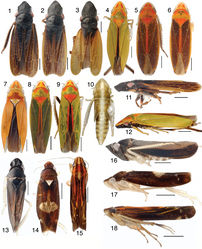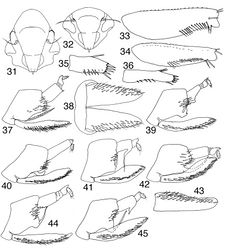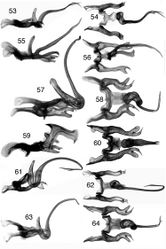Ilyapa bifida
| Notice: | This page is derived from the original publication listed below, whose author(s) should always be credited. Further contributors may edit and improve the content of this page and, consequently, need to be credited as well (see page history). Any assessment of factual correctness requires a careful review of the original article as well as of subsequent contributions.
If you are uncertain whether your planned contribution is correct or not, we suggest that you use the associated discussion page instead of editing the page directly. This page should be cited as follows (rationale):
Citation formats to copy and paste
BibTeX: @article{Dietrich2011ZooKeys124, RIS/ Endnote: TY - JOUR Wikipedia/ Citizendium: <ref name="Dietrich2011ZooKeys124">{{Citation See also the citation download page at the journal. |
Ordo: Hemiptera
Familia: Cicadellidae
Genus: Ilyapa
Name
Ilyapa bifida Dietrich, 2011 sp. n. – Wikispecies link – ZooBank link – Pensoft Profile
Description
Length male 6.6–6.9 mm, female 7.0 mm. Crown pale orange-yellow, orange-red maculae broad, overlapping ocelli, anterior margin forming acute angle; pronotum and opaque areas of forewing bright green (mottled with yellow in specimens removed from ethanol), pronotum with semicircular macula distinct. Male pygofer processes extended mesad and curved dorsad but not or only slightly crossing midline; anal tube process short, triangular. Aedeagus asymmetrical, shaft tubular, in lateral view V-shaped basally, arched and sinuate distally, terminating in two slender, bladelike processes continuing in line with shaft but asymmetrically curved, one process with angulate projection near base. Female seventh sternite with posterior margin slightly produced, rounded medially. Fifth instar nymph pale olive green dorsally with broad white median longitidinal stripe extended entire length of body; venter white.
Material examined
Holotype male: PERU, Pasco, Yanachaga-Chemillén N.P., Refugio El Cedro, 2420 m, 10°33'07"S, 75°21'27"W, 10 October 2002 (D. M. Takiya) PE07 [USML]. Paratypes: 1 male, same data except 12 October 2002 (R. Rakitov) [INHS].
Etymology
The species name refers to the bifid apex of the aedeagus.
Notes
This species may be distinguished by its relatively long crown and the bifid apex of the aedeagus.
Original Description
- Dietrich, C; 2011: Tungurahualini, a new tribe of Neotropical leafhoppers, with notes on the subfamily Mileewinae (Hemiptera, Cicadellidae) ZooKeys, 124: 19-39. doi
Images
|


